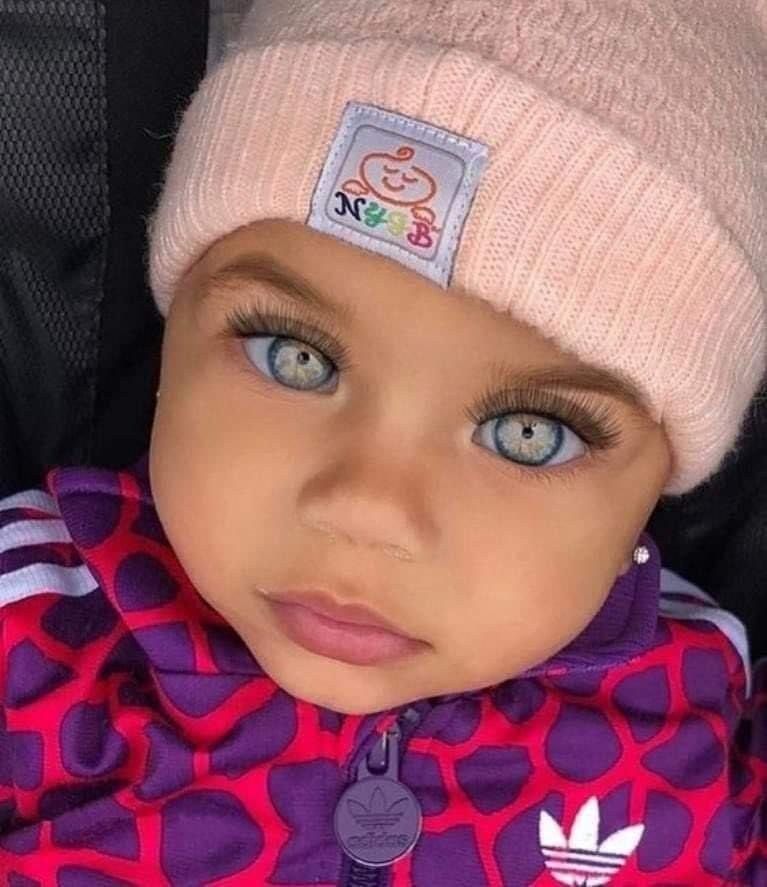Thylane Blondeau was only three years old when the world first took notice. With porcelain skin, storm-gray eyes, and that unteachable ease in front of a camera, she radiated a kind of beauty that photographers chase their entire careers to capture
. There was something uncanny about her—too poised for her age, too self-possessed for a toddler, as if she’d been born already understanding how to hold a gaze.
By ten, she was no longer just a promising child model. She was the child model—the one tabloids and fashion editors had dubbed
“the most beautiful girl in the world.” Vogue put her on its glossy pages; designers rushed to book her for campaigns; her image filled timelines and headlines around the globe. For most children, childhood is a blur of scraped knees and homework. For Thylane, it was lights, cameras, and the constant hum of adult admiration.
Her rise, though dazzling, wasn’t without controversy. Many people questioned whether any child—no matter how striking—should be thrust so early into a world obsessed with appearance. When her now-infamous Vogue photo shoot appeared, critics accused the industry of exploiting her youth.
Social media roared: some saw a prodigy; others saw a little girl robbed of innocence.
Through it all, Thylane’s parents—former footballer Patrick Blondeau and actress Véronika Loubry—stood firm. They insisted their daughter was happy, protected, and in control. “She’s doing what she loves,” they said. “She’s not being pushed—she’s just being Thylane.”
The noise eventually faded, as all online storms do. Thylane kept working, balancing school and modeling with a discipline well beyond her years. Her face became synonymous with the new wave of French beauty—natural, effortless, modern.
By sixteen, she had walked for major fashion houses, represented brands like Dolce & Gabbana, and built an Instagram following large enough to rival seasoned celebrities. Yet she never seemed swallowed by it. Interviews revealed someone surprisingly grounded, even shy, more interested in art and her friends than in fame.
At seventeen, she is no longer the cherubic child who stopped photographers mid-frame, but a young woman coming into her own. The transformation is striking—not because she has changed beyond recognition, but because she’s grown into exactly what the world predicted she would: confident, elegant, and entirely her own person.
Recently spotted vacationing in the south of France with her boyfriend, Thylane looked at ease—barefoot on cobblestones, sunburned shoulders, laughter spilling between stolen glances. There was no hint of the guarded posture that often follows childhood fame.
The photos that circulated from that trip didn’t scream “celebrity sighting.” They looked like what they were: a seventeen-year-old enjoying her life.
Her beauty, of course, remains undeniable. But now it feels lived-in rather than staged—less like a spectacle, more like a quiet force. She has the kind of presence that doesn’t need spotlight approval anymore.
Beyond the surface, Thylane has used her platform to branch out. She launched her own clothing line, Heaven May, inspired by her love of simple, wearable designs that reflect her personality rather than trends. She has dabbled in acting and continues to model, but on her own terms. The little girl who once belonged to fashion magazines has grown into a young woman who controls her own narrative.
Her story—of early fame, criticism, and resilience—is emblematic of a generation raised under the glare of social media but determined to define success differently. Thylane has managed something rare: she stepped into fame as a child and walked through it without losing herself. That balance didn’t come easily. She has spoken about anxiety, about the pressure of expectations, and about carving space for normalcy in a life that never really was.
“I think people forget that behind the pictures, I’m just a person,” she said in an interview. “I go to the supermarket. I hang out with friends. I’m not trying to be perfect—I just want to do what makes me happy.”
Those words sum up what makes her compelling today. Not the impossibly symmetrical features or the designer campaigns—but the calm defiance in choosing authenticity over spectacle. The child once labeled “the most beautiful girl in the world” is now a young woman who doesn’t need anyone else’s label at all.
Her journey from child prodigy to self-possessed adult offers a quiet lesson about growing up under the world’s gaze. Beauty might have opened doors for Thylane Blondeau, but character kept them from closing in on her.
At seventeen, she’s not chasing attention anymore—she’s choosing where to direct it. And that, perhaps, is her most striking transformation yet.
